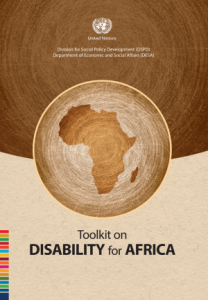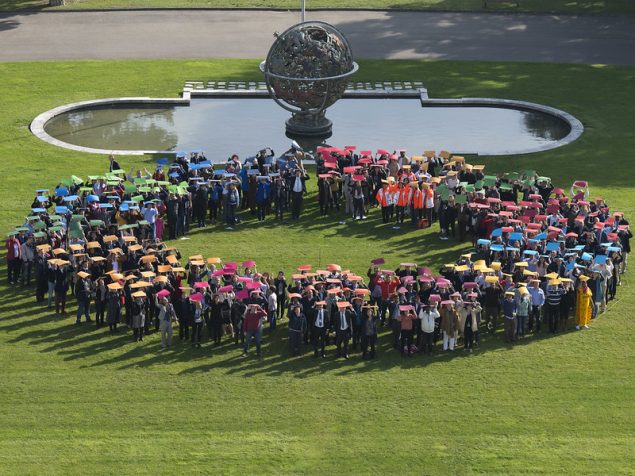Chapter Two: The Convention in detail
- Main page: Handbook for Parliamentarians
- Historical developments leading to a new convention
- The Convention at a glance
- The rights and principles enumerated in the Convention
- Obligations of States parties under the Convention
- Comparing the Convention to other human rights treaties
THE RIGHTS AND PRINCIPLES ENUMERATED IN THE CONVENTION
General principles
The general principles provide guidance to States and other actors on interpreting and implementing the Convention. The eight general principles are:
- Respect for the inherent dignity, autonomy, including the freedom to make one’s own decisions, and independence of persons;
- Non-discrimination;
- Full and effective participation and inclusion in society;
- Respect for difference and acceptance of persons with disabilities as part of human diversity and humanity;
- Equality of opportunity;
- Accessibility;
- Equality between men and women; and
- Respect for the evolving capacities of children with disabilities and for the right of children with disabilities to preserve their identities.
Rights
While the civil, cultural, economic, political and social rights specified in the Convention apply to all human beings, the Convention focuses on the actions States must take to ensure that persons with disabilities enjoy these rights on an equal basis with others. The Convention also addresses the specific rights of women and children, areas in which State action is required, such as data collection and raising awareness, and international cooperation.
The explicit rights set out in the Convention are:
- Equality before the law without discrimination
- Right to life, liberty and security of the person
- Equal recognition before the law and legal capacity
- Freedom from torture
- Freedom from exploitation, violence and abuse
- Right to respect physical and mental integrity
- Freedom of movement and nationality
- Right to live in the community
- Freedom of expression and opinion
- Respect for privacy
- Respect for home and the family
- Right to education
- Right to health
- Right to work
- Right to an adequate standard of living
- Right to participate in political and public life
- Right to participate in cultural life
PARTICIPATION: A PRINCIPLE AND A RIGHT
The principle of participation and inclusion aims to engage persons with disabilities in the wider society and in making decisions that will affect them, encouraging them to be active in their own lives and within the community. Inclusion is a two-way process: persons who have no disabilities should be open to the participation of persons with disabilities.
The Convention specifically recognizes the right to participation in political life, such as through voting in parliamentary elections, and in cultural life, such as through assisting in cultural, sporting and other recreational activities. However, the realization of the right to participate sometimes requires specific State actions. For example, a blind person might require voting material in Braille and might also require personal support in the voting booth so that his/her choice is clear. If a voting station does not have ramp access or is too far from home, a person in a wheelchair might be hindered from voting, hence his/her right to participate in political life is obstructed.
The Convention recognizes that certain people are exposed to discrimination not only on the basis of disability, but also on the basis of sex, age, ethnicity and/or other grounds. Thus the Convention includes two articles devoted to specific individuals: women with disabilities and children with disabilities.
The Convention sets out specific areas for State action. Establishing a right is not the same thing as ensuring that that right is realized. This is why the Convention obliges States parties to provide the appropriate enabling environment so that persons with disabilities can fully enjoy their rights on an equal basis with others. These provisions relate to:
- Raising awareness – so that persons with and without disabilities understand their rights and responsibilities;
- Accessibility – fundamental to the enjoyment of all rights and to live independently in the community;
- Situations of risk and humanitarian emergencies – a cause of disability that requires specific action by the State to ensure protection;
- Access to justice – essential for persons with disabilities to claim their rights;
- Personal mobility – to promote independence for persons with disabilities;
- Habilitation and rehabilitation – for persons with a disability from birth and people who have acquired a disability, respectively, to enable those persons to attain and maintain maximum independence and ability;
- Statistics and data collection – as a basis for formulating and implementing policies to promote and protect the rights of persons with disabilities.
EQUALITY BETWEEN MEN AND WOMEN
Women with disabilities might experience discrimination on at least two levels: on the basis of sex and on the basis of disability. The principle of equality between men and women requires States to promote equality between men and women and to combat inequality when implementing the provisions of the Convention. Article 6 of the Convention specifically recognizes that women and girls with disabilities are subject to multiple forms of discrimination, including on the basis of disability, on the basis of sex and sometimes on other grounds as well. Equality between men and women is not only a guiding principle of the human rights work of the United Nations, it is also a right in and of itself.
International cooperation
International cooperation is widely recognized as vital for ensuring that persons with disabilities can fully enjoy their human rights. The Convention expressly acknowledges this relationship, and obliges States parties to cooperate with other States and/or with relevant international and regional organizations and civil society in:
Building capacity, including through the exchange and sharing of information, experiences, training programmes and best practices;
Research programmes and facilitating access to scientific knowledge; and
Technical and economic assistance, including facilitating the use of accessible and assistive technologies.
By including a separate article on international cooperation, the Convention underlines the need for all such efforts, including international development programmes, to be accessible to and inclusive of persons with disabilities. Given that, in many countries, there is a higher percentage of persons with disabilities living in poverty than living in other sectors of society, a failure to include persons with disabilities in planning and implementing development programmes would only exacerbate existing inequalities and discrimination within society.
The Convention affirms that not only do States parties have a role to play in fostering international cooperation to promote the rights of persons with disabilities, but civil society, including organizations representing persons with disabilities, and international and regional organizations, such as the United Nations specialized agencies, the World Bank and other development banks, and regional organizations, such as the European Commission and the African Union, do, too.
ACCESSIBILITY
The principle of accessibility aims to dismantle the barriers that hinder the enjoyment of rights by persons with disabilities. The issue concerns not just physical access to places, but also access to information, technologies, such as the Internet, communication, and economic and social life. The provision of ramps, sufficiently large and unblocked corridors and doors, the placement of door handles, the availability of information in Braille and easy-to-read formats, the use of sign interpretation/interpreters, and the availability of assistance and support can ensure that a person with a disability has access to a workplace, a place of entertainment, a voting booth, transport, a court of law, etc. Without access to information or the ability to move freely, other rights of persons with disabilities are also restricted.
Next – Chapter Two: Obligations of States parties under the Convention




